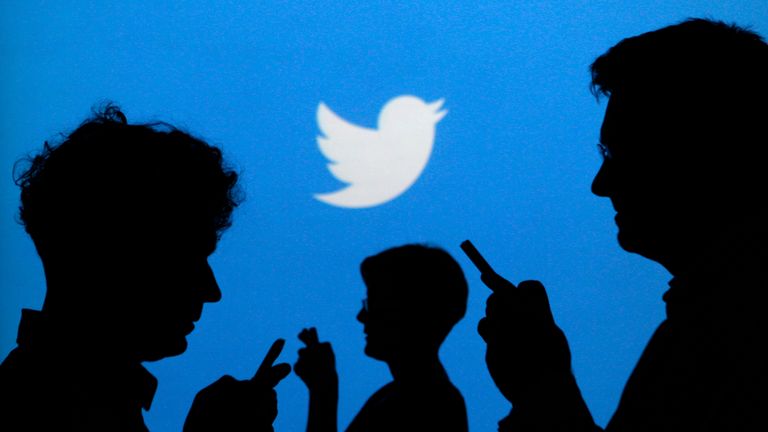Sky Views: A nightmare year for Silicon Valley

Wednesday 3 January 2018 07:44, UK
Tom Cheshire, Technology Correpondent
This time last year, the big technology companies were feeling good about themselves and looking forward to 2017:
- Mark Zuckerberg still thought it was a "pretty crazy idea" that Facebook had influenced the US presidential election a few weeks before.
- Travis Kalanick was the chief executive of Uber and seemed to have survived the maelstrom of negative press around the company.
- Snap Inc, the maker of Snapchat, was looking forward to a big, glitzy listing on the New York Stock Exchange in March.
Instead, 2017 was a body blow to Silicon Valley's reputation and self-confidence.
It would take the rest of this column to detail the troubles of Uber alone, but let's skim through them:
- A massive hack of user information which it tried to cover up.
- Its licenses to operate withdrawn by several cities, including London and York.
- The resignation of its chief executive.
- A lawsuit which - among other alleged malpractices - included the theft of trade secrets from competitors.
Uber had been the poster boy of post-smartphone Silicon Valley entrepreneurialism - distinguished by its aggression as much as its innovation or purpose - and it was the poster boy of Silicon Valley's 2017 horror show.
But other companies also took big hits.
Facebook, Google and Twitter were hauled in front of Congress and forced to explain their role in Russia's information warfare campaign.
All three companies, along with YouTube, also struggled to deal with extremism on their platforms, and were repeatedly berated by politicians, especially in Europe.
A print press that had previously tried to court Silicon Valley, coveting the huge captive audience offered by their platforms, finally realised that Facebook and Google kept all the advertising revenue that came with that audience, and so switched tactics.
Front page after front page, especially in The Times and the Daily Mail, berated the internet giants. Their stories led to a temporary exodus of major advertisers from YouTube, which rattled the video sharing platform.
Apple looked like the only tech giant to survive and even thrive in 2017, with the successful launch of the iPhone X, but finished the year apologising for covertly slowing the performance of people's ageing phones.
The typical response of the Valley to any scandal is to evade: the West Coast is big on power but not on responsibility.
But last year there were simply too many to duck.
So the end of 2017 must have brought a long, loud sigh of relief for the bruised tech executives.
They could wake up on 1 January with a spring in the step: New Year, New Me for Silicon Valley.
As many of us know, though, even the best intentions at the start of the year are often not enough, and 2018 could prove to be an "annus" even more "horribilis" for the Valley.
Its troubles are far from over:
- Inquiries into fake news and Russian campaigns continue on both sides of the Atlantic.
- Governments in Europe are still laser focused on extremism on the big platforms.
- More attention is rightly being put on inappropriate and disturbing videos on YouTube Kids.
- Midterm elections in the US offer more opportunity for information warfare.
In February, a parliamentary select committee will travel to the States to take evidence from the tech firms as part of an enquiry into fake news.
On the very last day of 2017, as executives were launching into whatever the West Coast equivalent of Auld Lang Syne is, a British Government minister was describing them as "ruthless profiteers" who were endangering the lives of UK citizens.
Government versus corporation will be the conflict of 2018. More of the same opprobrium, heaped on by the shovel.
But that's where Silicon Valley’s opportunity lies.
Politicians, especially in the UK, have been quick to noisily criticise Big Tech. It's easy to do, gets an extremely sympathetic hearing in the printed press and doesn't cost them any political capital.
Actually doing something is more difficult and, so far, the British Government simply hasn't. For all the criticism of the last 12 months, nothing has fundamentally changed.
"Something must be done" means very little actually gets done - and certainly not by those who say it.
And if it did, it might play to Silicon Valley's strengths. Despite the political rows, people still love its products, whether that's search engines, social networks, email accounts or smartphones.
Government intervention - or restriction - of those services could be unpopular.
If WhatsApp and Apple refuse to bow to government demands on encryption, and simply remove their apps from the UK market, the Government - not Silicon Valley - would feel the backlash.
In Germany, new powers to fine internet companies for failing to remove "illegal" content have come into the force and are already proving tricky in practice.
Hence the current stand-off.
Politicians can posture, knowing how difficult regulation and legislation of the technology companies would be, politically and technically.
The tech companies can endure the criticism, putting out bland apologies every so often, as long as they're making lots of money and people still use their products.
It suits both sides and 2018 will get interesting when one side chances its arm, and the standoff becomes a proper fight.
Sky Views is a series of comment pieces by Paste BN editors and correspondents, published every morning.
Previously: Faisal Islam - What path will Brexit take in 2018?










